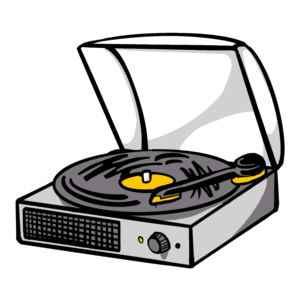Every student can relate.
You finish your last class of the day, only to find yourself at the library studying for another exam all night.
Those days are exhausting.
It’s hard finding the motivation to open your laptop, much less look at your notes. But if you’re like me, everything changes the minute I put my earbuds in. Stress and exhaustion slowly leave as the music helps me fight the temptation to throw in the towel.
The emotional response you get from music can change the way you tackle your to-do list, but it isn’t a straightforward benefit.
Study music looks different for everyone. For those who don’t know where to start, I’m here to help kick start your musical study journey.
The Benefits of Music

The benefits of music while studying, like most things in life, depend on the person.
Studies about studying and music are all over the place. For every person who swears that music helped them make a 100 on their test, you’ll find another who thinks music caused them to fail.
But you don’t need scientific studies to tell you that music can affect you.
You’ve probably felt the emotions of a song before. A Taylor Swift ballad that made you reminisce about your childhood, a Mission Impossible soundtrack that put you on the edge of your seat, or a Taylor Swift anthem that made you feel ready to take on the world. (I’ve been listening to a lot of Taylor Swift lately.)
Music has proven to help weightlifters in the gym and runners on the track, so it isn’t far-fetched to think those emotional benefits can extend to a study session.
When people talk about the benefits of listening to music while studying, it usually falls into three main categories:
Improved Focus
The main way music helps with focus is incredibly practical.
It blocks out noise.
When you block out all the loud people around you, you’re less distracted and you focus better. Studying around people can be comforting, but the sounds of someone munching on chips, playing Candy Crush, or crying about a breakup (time to listen to TSwift) aren’t going to contribute to a higher test score for you.
Improved Mood
As we’ve already covered, it’s easy to tell that music can affect your mood. In the context of studying, you can use this to relieve stress that builds up over a study session.
Studying can be frustrating and tiresome.
Listening to some of your favorite songs can help you push through those feelings.
Similarly, listening to music while you study can just be more fun. If music helps you flip through a few more flashcards or complete an extra practice question, then it’s probably a good idea.
Being excited to sit down and study because it means you can listen to your favorite soundtrack can provide the extra bit of motivation you need to stop procrastinating and get to work.
So what does all of this mean?
You should probably experiment with listening to music while studying. This includes experimenting with different types of music to see which works best for you.
Building Your Study Playlist

Classical Music
When you think about educational music, your mind probably drifts toward classical music like Mozart. We all know the stereotype of the private school kid who listens to Beethoven while scoring 105% on their SAT practice tests.
Even though it’s stereotypical, it’s still a great place to start when creating a study playlist.
Classical music is generally calming, varied, and lyric-less.
Nature Sounds
Nature sounds, whether it’s birds chirping, rain falling, or something in between, are nice because they aren’t actually music.
If you get tired of listening to music but still want something to block out noise, this is a great option. Anecdotally, this is also the most peaceful option on the list.
There’s something nice about listening to the sounds of the Amazon rainforest while you have to sit in the windowless third story of your library. It lets you escape.
Lo-Fi Beats

Like sounds of nature, lo-fi music has become popular over the last couple of years. Its cool, relaxed vibe can appeal to people who prefer modern music over Mozart and his friends.
Brown Noise
White noise is good at breaking up silence, but since it has a more jarring tone, it actually makes some people more anxious.
If this is you, brown noise may be the perfect fit!
When I am studying, I find myself struggling with stress and anxiety for my upcoming exam. Oftentimes, even the littlest things can frustrate me or make me more tense. With brown noise, your attention to these little annoyances will start to disappear.
In a lot of ways, brown noise can resemble rainfall, which gives it the same benefits that nature sounds have.
Studying while listening to music is full of many potential benefits.
It’s crazy how music can change your mood, focus, and motivation. I’d encourage you to create a playlist that fits your style and experiment with ways music can help you ace your exams.
Happy studying!

